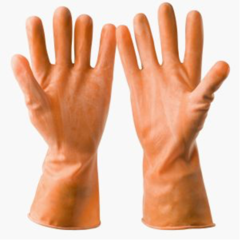Each year there are approximately 384,000 sharps related injuries to health care workers. That amounts to about 1,000 injuries per day at an average cost of about $3042 per victim. $1 Billion is spent annually on lab fees, testing, counseling, and post exposure follow ups from sharps related injuries. That doesn’t include the emotional fallout associated with the injury.
The anxiety, fear and the "what ifs" can be debilitating for some! With that being said, there is one tried and true way to protect yourself and prevent sharps injuries in the Dental Practice. That is by wearing utility gloves whenever handling contaminated instruments or when you are performing housekeeping tasks that involve contact with blood or other potentially infectious materials!

Use utility gloves when handling contaminated dental sharp instruments. Use them while processing instruments in the sterilization area.
Utility gloves only cost about $20 and they are your friend!
I get it, you’re in a rush, have a crazy schedule, and are running behind; but take time to put the utility gloves on and protect yourselves and the people you are going home to! The Occupational Safety and Health Administration (OSHA) says, “The person handling the instruments through removal, cleaning, packaging and sterilization needs to use heavy-duty gloves to help prevent injury with sharp contaminated instruments.”
I’m not going to overlook the fact that heavy-duty gloves (utility gloves) feel more awkward than examination gloves, it is probably the worst aspect of wearing them. They aren’t meant to comfortable, that’s for sure. They are meant to provide extra protection while handling instruments during the cleaning, rinsing, drying, packaging and sorting procedures that take place during instrument reprocessing.
But I HATE Wearing Them!
Yes, I know, utility gloves are bulky, hot and have minimal tactile sensitivity. Let me tell you, I was in the dental field for over 15 years, myself. I totally understand why you don’t want to wear the utility gloves. I HATED wearing them too! But, as bad as utility gloves are, they sure beat having to take a series of prophylactic medication to prevent a disease you might contract from a sharps injury. It’s not worth the worry, time and burden. And if wearing utility gloves is all it takes to ensure that you won’t get stuck, the choice seems easy.
When you’re debating whether or not you should wear your utility gloves, think about this… your kids, your spouse, whoever it is you’re going home to, they expect you to come home healthy. Whatever you may bring home from the dental office, you are exposing to your loved ones. You owe it to yourselves and your families at home to stay safe! And, as clunky and as annoying as they are, utility gloves do serve their purpose.
Utility gloves that are puncture and chemical resistant should be readily available through your dental supplier. They need to be used, not only when we are handling contaminated instruments, but also when performing housekeeping tasks involving contact with blood or other potentially infectious materials (OPIM).
The utility gloves are much more heavy duty than your exam gloves but it’s their thickness that prevents the puncture of the contaminated needle or instrument. These utility gloves can be washed and disinfected for reuse; you must just follow the manufactures directions regarding this. Also, check your utility gloves regularly. Look for tears, cracks or punctures and replace them immediately when and if you see damage.
Keep Each Other Safe: Use Utility Gloves
Here is the next important part of utility glove use. We must work to keep each other safe by reminding our coworkers to wear their utility gloves! We have all done it and seen it, it is usually faster and easier to get the job done WITHOUT donning the cumbersome utility gloves, so we very quickly begin to perform the task. I mean, what are the chances we are going to get stuck with something? Then, what are the chances that the sharps instrument we were stuck with IS contaminated?
Listen, we were all taught standard precautions. We treat every patient and every instrument the same. We don’t know who may be infected and with what, so we take the same precautions with every patient, being as safe as possible assuming they may have something. This is the safest way to ensure our safety and the safety of our patients. I don’t know about you, but having a run in with a sharps instrument does not sound like my idea of a good time.
We have an absolute obligation to ourselves, to our families, and to each other to stay as safe as we possibly can. Your health is no joke and you only have one life to live. Protect yourself!
Be well. Do Good. Be blessed (and put your gloves on).
- Tink
Dental Compliance Specialists helps make dental offices safer for patients, dentists and their employees. We help our clients develop and maintain their compliance programs including OSHA/Infection Control, HIPAA, DEA regulations and prescribing practices, Radiation Safety, OIG/Medicaid Compliance, Record Auditing, and more by providing actionable systems, easy-to-use tools, robust training, and accountability. Most of our clients have never been in trouble and want to keep it that way. Sometimes, though, dentists call when they are in trouble. In either case, we are there to make a meaningful difference. If you need help call us at 817-755-0035.


